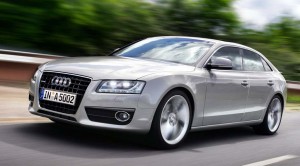
Audi is counting on its expanding line-up, including the upcoming A5 Sportback, to help it gain global share and keep its balance sheet in the black.
The global slump may have taken a toll on Audi’s sales and profits, but the automaker insists the downturn could play to its advantage, longer-term.
The German maker, a semi-autonomous arm of giant Volkswagen AG, reported that it was able to stay in the black, during the first half of 2009, unlike many of its competitors, though profits still slipped by 25%. Sales slipped 9.7% from January through June, noted Chief Financial Officer Axel Strotbek, but that was also a fair bit better than the overall, 18% industry downturn, he stressed, during a conference call with American journalists.
“We want to use this opportunity to emerge from the current crisis considerably stronger,” the executive said, “a winner in the long-term.”
At the current exchange rate, Audi AG posted a net first-half profit of $979.5 million, or €697 million. During the same six-month period last year, Audi’s net was €903 million.
Meanwhile, unit sales fell from 516,219 to 466,000, a nearly 10% dip. The decline varied sharply from country to country, Strotbek noted. In fact, volume increased in China by 10.5%, where Audi now holds a 42% share of the premium car market. Early in the year, the Chinese government took aggressive steps to revive faltering momentum in the country’s automotive market – now the single largest national market in the world. It is now Audi’s second-largest market, after Germany.
Like many industry leaders, Strotbek has been cautious about declaring any sort of victory. In a separate briefing, the CFO cautioned that while, “We’re very satisfied with the result for the first half year, (we) are keeping our feet on the ground because we expect to face some difficulties in the second half of the year.”
The year’s global crisis has bankrupted two American automakers and left others struggling to stay afloat, often by cutting even their most critical operations. Strotback noted that Audi’s relative success rides on the steady expansion of its product portfolio, something it intends to keep growing.
“No reductions were made to planned product development,” he emphasized, adding that this will, “lay the foundation for future growth despite the current crisis.”
In recent months, Audi has unveiled an assortment of new vehicles, including a new version of its R8 sports car, and convertible versions of its A5 and S5 coupes. A new A5 Sportback is approaching launch and, next year, the automaker will roll out its smallest premium model yet, the pint-sized A1.
Notably, that mini-compact won’t come to the States, said Strotbek, at least not for the foreseeable future. Like its competitors, Audi is struggling to figure out where the American market is going. It is launching a line-up of diesels, hoping that these high-mileage, high-performance offerings will overcome long-standing U.S. resistance to “oil burners.”
The American market lags, in terms of market share, compared with other key developed markets, despite years of effort to build up against competitors like Mercedes-Benz and BMW. There had been talk about building a U.S. assembly plant, but for now, at least, that is off the table, cautioned Strotbek. Nor is Audi interested in producing one of its products in a new American assembly line being built by its partner, Volkswagen.
“We made up our minds (for) the near future,” said the executive, a one-time student at the University of Chicago., but eventually, the plant project could go back on the drawing board, he hinted, “with a product that fits in the American market.”

Audi’s current success is probably in no small part due to the second and third Transporter movies with Jason Statham. As Roger Ebert said, “that A8, what a car”.